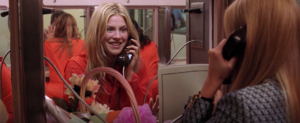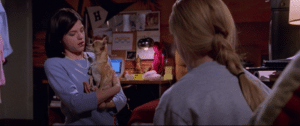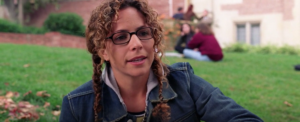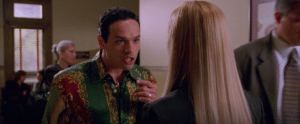Why Pit 'Alien' Against 'Aliens' When Ripley is Great in Both?
Ripley is a great character because she serves two distinct, but rewarding, purposes in the original film and the sequel.
Incluvie Foundation Gala - Learn More


Spoilers for Legally Blonde ahead.
It’s not hard to see why Legally Blonde (2001) drew in an army of proud defenders over 20 years ago. One can’t deny the fact that, even now, it remains a standard of feminist filmmaking, as Elle Woods’ relentless positivity and determination, along with Reese Witherspoon’s nuanced handling of the character, helped the film blossom into an empowering portrayal of women defending women, undermining misogyny, and subverting tired stereotypes associated with themselves. That it was made during a time in which it seemed three-dimensional female characters were being cast aside in favor of objectified rom-com hotties willing to do anything for the sake of winning a man’s heart, and for male-centric blockbuster franchises like The Lord of the Rings (2001-2003), is only another feather in its cap. No doubt it was refreshing to see a woman using her cunning intellect, rather than her body, to seize the day, while also utilizing the parts of her personality so many others would have written off as useless.
The box office success of the film, its sequel, and its musical adaptation are sure indicators that the film’s iconic stance for female empowerment rings especially true in the #MeToo era. However, Legally Blonde was, if nothing else, a product of its time. What it achieves in its portrayal of women, it falls short in its portrayal of other marginalized groups. Because of the context of its release, these problems don’t immediately present themselves. However, viewing the film with a 2021 lens leaves it open to fairer criticisms due to greater acknowledgment of indecencies against racial and sexual minorities. This is almost as if to ask the question of what it would have to do differently in order to be fully acceptable in today’s film-viewing culture.
Elle Woods is an undeniable embodiment of endless hustle and self-actualization; upon being dumped by her ambitious boyfriend, Warner Huntington III (Matthew Davis), on the grounds that she is not smart or determined enough for him, her decision to follow him to Harvard Law School in order to prove herself to him is quickly altered into one of proving to herself that she has it in her to accomplish great things once she fully commits to her passion for law. This she does while still holding onto the qualities that allow her to stand out, namely her femininity, her bubbly personality and sorority sister status, and her remarkable knowledge of the fashion world. At the time of its release, Legally Blonde could have very well been viewed as a milestone because of how it portrayed a female protagonist who is able to harness these qualities that others would misinterpret as useless and shallow. Indeed, it is this “useless” knowledge that allows her to both gain the trust of Brooke Windham (Ali Larter), her first client and former sorority sister who is on trial for murder, and exonerate Brooke by the film’s conclusion. Elle’s drive in the courtroom demonstrates a kind of emotional intelligence not often seen on theater screens in 2001.

Legally Blonde is also a rewarding presentation of the benefits of women supporting other women aside from themselves. This largely begins after Elle finally sees that Warner will never see her as good enough for him. The energy she puts into trying to see the good in him is then altered and allows her to see the redeeming qualities of the other women she encounters at Harvard, especially Warner’s new girlfriend, Vivian Kensington (Selma Blair), with whom she initially clashes due to their shared interest in Warner. It’s a tasteful display of genuine camaraderie that the two are able to put their differences aside and become good friends while working the Windham case as part of their shared internship. This, along with the close bond Elle forms with local manicurist Paulette (Jennifer Coolidge), allows the film to take on some very challenging themes of how women are viewed by both society at large and in the workplace.

The overtly judgmental nature of society towards women often encourages other women to join in out of fear of being subject to the same kind of ridicule, but to do so is to conform to the expectations a masculine-controlled social hierarchy will frequently lay out. Legally Blonde is a reminder of how refreshing it can be when two women with divergent personalities are able to come together in order to address bigger issues at hand. This is apparent when Elle helps the often passive Paulette stand up to her abusive ex-husband and eventually attract the attention of a handsome delivery, but even more so after she is standing tall in the wake of being sexually harassed by her boss, Callahan (Victor Garber). Vivian initially misinterprets the situation as Elle using her body to move up in the world, demonstrating the very real stigma that is placed around victims of assault. Thankfully, the situation is very quickly resolved and Callahan receives his due comeuppance by the film’s conclusion. But this is further proof that the issues the film dared to address lingered long before the #MeToo and Time’s Up movements were ignited, and that even the most warm-hearted films could take the time to touch upon them in a very mature way.

Admittedly, beyond the fact that she is wronged by many of the men in the film, one reason we find it so easy to root for Elle is because she is a white, upper class woman with the money to put towards a valuable education at USC and Harvard. She lives the kind of life and possesses the kind of knowledge many of us can only dream of having. In fact, early 2000s mentality of the film means that its rightful bolstering of its female characters often results in a startling lack of diversity regarding other oppressed minorities whose issues were not granted full attention at the time.
Take the character of Enid Wexler (Meredith Scott Lynn), for example. Along with Elle, Vivian, and Warner, Enid is the fourth law student awarded an internship to work with Callahan and his research assistant, Emmett Richmond (Luke Wilson), on the Windham case. She, along with many others at Harvard, is also initially disapproving of Elle’s personality before growing to respect her as a colleague. What separates Enid from her classmates is the fact that she is open about her lesbianism and how she intends to specialize in law related to LGBTQ+ rights. She is the most proudly feminist character in the film, yet once she receives the Windham case, she is all but written out of the main narrative as the drama between the other three interns takes over.

Granted, Elle is the only character in the film with any real character development, and even most of the female characters are defined by what Elle does for them, but it often feels like her development as a straight woman comes at the expense of Enid’s as a lesbian activist. It’s one thing to include an actual feminist in the film, but it’s another thing entirely to give said feminist little to no development and then purport to espouse the same kind of beliefs. While there is nothing wrong with Legally Blonde wanting to gradually ease into its status as a feminist film — going all in all the time doesn’t work for everyone — doing so shouldn’t have to involve any disservice to the characters that can help the audience, and even other characters, understand the important issues.
Legally Blonde’s feminism also triumphs at the expense of its portrayal of race along with sexuality; you just might be able to count the number of people of color in the film on one hand. The people of color we do see, aside from Judge Marina Bickford (Francesca P. Roberts), don’t serve much of a purpose other than to be people Elle must prove herself to before allowing her to have her shining moments in the courtroom. What’s more is that you’ll find even fewer of these characters on the campuses of Harvard and USC, an implication of the very clear relationship between race and financial well-being in the United States that the film superficially ignores. It’s all a very degrading exercise best exemplified by the character of Enrique (Greg Serano).
Enrique is Brooke Windham’s Latinx pool boy who appears in court to testify against her by stating that the two were having an affair in order to implicate her as her husband’s killer. He is very clearly lying about the ordeal in order to save himself, and the fact that he has no other motive for doing so results in him being stereotyped as someone trying to work against the interests of “honest Americans.” Even when the subject of him wearing a bikini as part of his duties for the Windham family arises, it’s played off for laughs.

Enrique, though admittedly a liar, is used for unwarranted, sexuality-driven humor, as well. Elle only comes to realize he is lying on the stand when he makes a comment about her shoes, which he immediately recognizes as Prada. Elle, in turn, concludes that he is gay and can’t be having an affair with Brooke because “gay men know designers.” This is yet another superficial assumption regarding minorities that the film gets away with. Later, when Emmett catches Enrique in the act, he again becomes the target of humor once he smears his boyfriend, Chuck, in a last-ditch effort to save himself, an act Chuck takes great offense to before storming out of the courtroom.
Legally Blonde doesn’t wear its mistreatment of minorities on its sleeve, however, and you can chalk it all up to the unfortunate societal circumstances in which it was released rather than the screenplay. Marriage equality was still years away, as sad as that is, and intersectionality was not given full recognition until fourth wave feminism kicked off in 2012. With so many barriers to break down, you can give it credit for not trying to pander to everyone it seeks to represent. Sometimes, it may be better to do nothing at all than to do something half-heartedly and disingenuously, and know it. As for the barriers it successfully breaks down, it does so in strides. What it still remains is a heartwarming, encouraging film with the daring to subvert tropes and permanently put stereotypes regarding women away. While its flaws are no longer insignificant, its unprecedented level of girl power, along with the empowering path Elle Woods takes to stay true to herself in order to achieve a real goal, is enough to remember it fondly twenty years later. Just remember to do so with a knowing lens, cause two decades can make all the difference.
Related lists created by the same author
Ripley is a great character because she serves two distinct, but rewarding, purposes in the original film and the sequel.
Related diversity category
Horse racing is a very difficult sport and challenge, especially for a young woman like Michelle Payne.